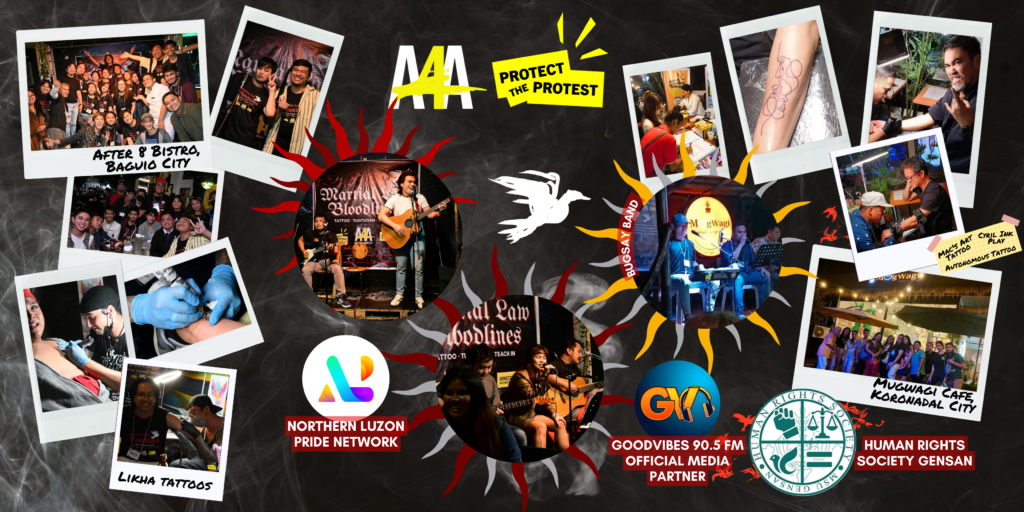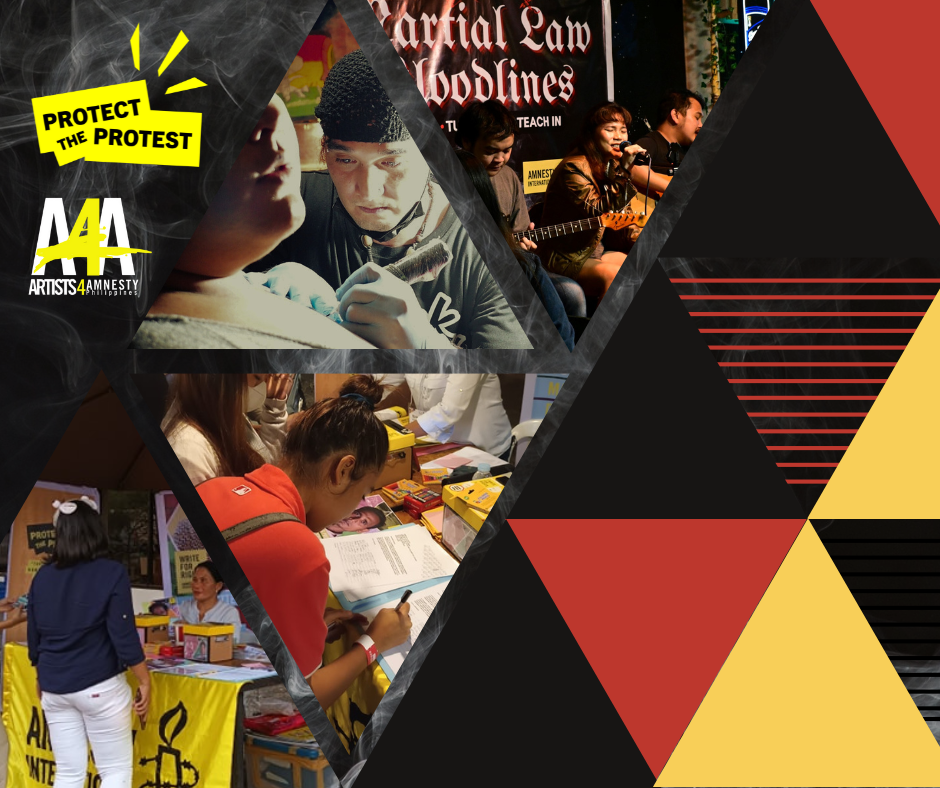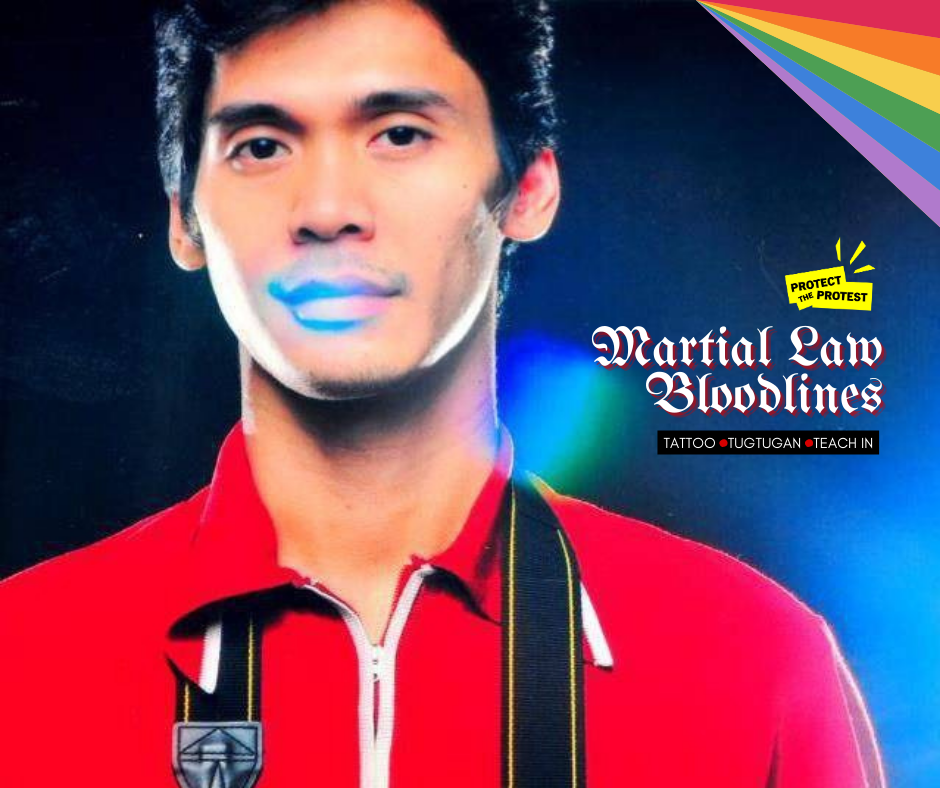TATTOO | TUGTUGAN | TEACH IN
On the 50th anniversary of the declaration of martial law in 2022, Amnesty International Philippines started its year-long teach in on generational trauma brought about by the Marcos dictatorship to children and families of Martial Law heroes and survivors.
The Martial Law Bloodline project, in partnership with Artists for Amnesty, hopes to center on the commitment of ensuring that through collaboration and ARTivism, our history is not forgotten nor distorted, and protest movements strengthened and celebrated.
The title ‘Martial Law Bloodlines’ is a nod to the act of bloodlining in tattoo representing its permanence, like the effect of Marcos’ dictatorship to the Filipino psyche. It also symbolizes the bloodline of martial law heroes and survivors – their second generation, their children who still carry the trauma brought about by the era.
Strengthening our efforts in providing positive narratives about martial law heroes and their families, Amnesty International Philippines’ Martial Law Bloodlines Festival ensures freedom of expression and association are protected. Never again! Never forget the horrors brought by Marcos’ martial law to basic civil liberties such as freedom of expression and association, and the right to protest. We are enabling more diverse groups of people to connect and organize their communities in online and offline safe spaces where they can challenge repression and inspire more people to actively work together safely against human rights injustices.

TATTOO | Why Martial Law Bloodlines?
The term “bloodlines” is a nod both to tattoo “bloodlining” – where the artist outlines an entire tattoo very lightly with a hint of ink or water to lubricate the needle; and the line of descent, ancestry, birth, genealogy, or kin representing the children and relatives of martial law heroes.
Tattoos have always been regarded as symbols of political act of resistance within cultures that demand conformity. An act of protest, it represents bodily autonomy, control, and the right to make decisions over one’s own life and future – something that any form of authoritarianism or dictatorship strips off of people.
Like the permanence of tattoo, the second generation of martial law heroes as well as the entire Philippines must never forget the atrocities and human rights violations committed during Marcos’ dictatorship, learn lessons and impart its influence on activism and protest as we know now.
This hopes to center on the commitment of ensuring that that our history is not forgotten nor distorted, and protest movements strengthened and celebrated.

TUGTUGAN | Artists for Amnesty
Amnesty International Philippines endeavors changing the narratives distorted by historical revisionism with the help of Artists for Amnesty and second generation relatives of martial law heroes. We partnered with tattoo artists and organizations to put together the first two legs of Martial Law Bloodlines Tattoo Festival in Luzon and Mindanao. In the tradition of collaborating with individuals and groups from diverse forms of activism, booths for tattoo artists and various advocacy were set up, and the stage was opened to musicians, poets, and filmmakers in Baguio City and Koronadal City in November and December 2022.
TEACH IN | Partnership with organizations and relatives of Martial Law Heroes
The idea of conducting “teach ins” on the generational trauma effects of martial law as told by the children and relatives themselves of martial law heroes is an attempt to offer an alternative narrative to the discourse on martial law human rights violations. We heard the victim-survivors tell their stories, this time, we listen to their children and relatives. Breaking the cycle and ripple effects of general trauma also ensures that we will never forget, and we never let the horrors of martial law accumulate and passed down again.
A new partnership with EngageMedia through their Cinemata video platform offers a wide array of martial law related films and videos to be screened in the upcoming Visayas leg and the culminating festival on 21 September.
Daluyong: Political Filmmaking in a Period of Social Unrest Redux
Politics of Detention, by Haring Ibon
Ang Pasiong Mahal ni Beverly Apostol (The Passion of Beverly Apostol), by Miguel De Guzman, Alab View Pictures
Truth Tellers by Ilang-ilang Quijano KI Multimedia
Martial Law: Never Ever Again, by Pinoy Media Center
Balon (Waterwell (2021), by Maki Liwanag, UP Diliman
Still Here Still Walking (2021), by Kat Calatalan
Then and Now: Films on human rights in the Philippines from the 34th Gawad Alternatibo film festival
Ignite Conversations
Watch Issa Manalo Lopez talk about generational trauma brought about by the Marcos dictatorship to children and families of Martial Law heroes and survivors in the launch episode of Martial Law Bloodlines on Ignite Conversations. ⯈

⯇ For the Visayas Leg, Ron De Vera joined us in Iloilo to talk about his experiences as a child of human rights defender, Adora Faye De Vera and desaparacido, Noni Manaoag. Ron’s mother, Adora shared her experiences in detention during martial law with Amnesty International which was published in Amnesty’s Mission Report of 1982.

